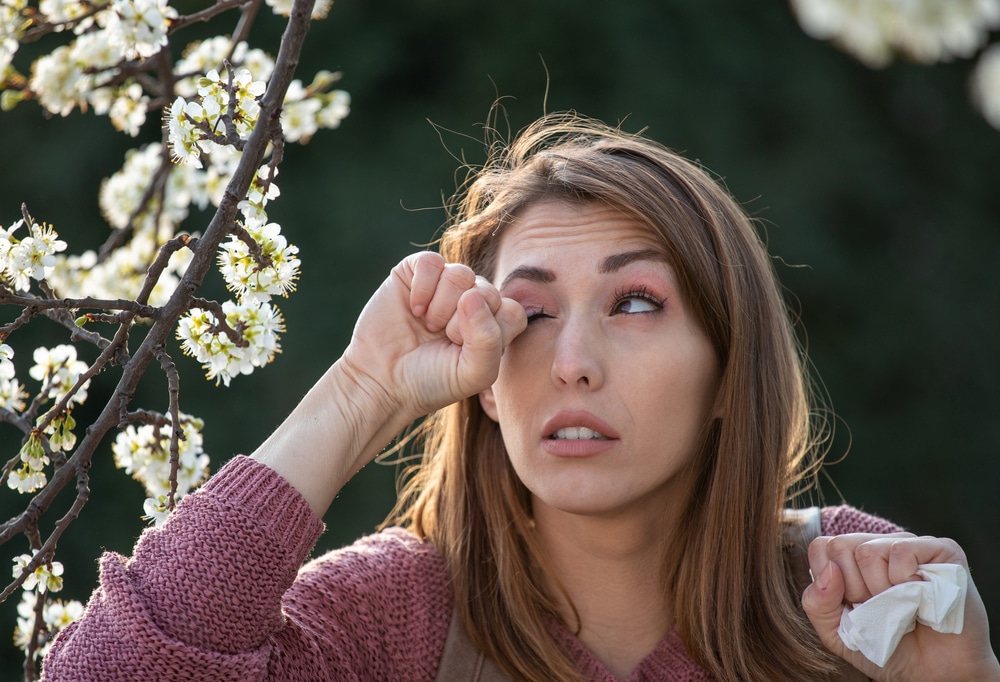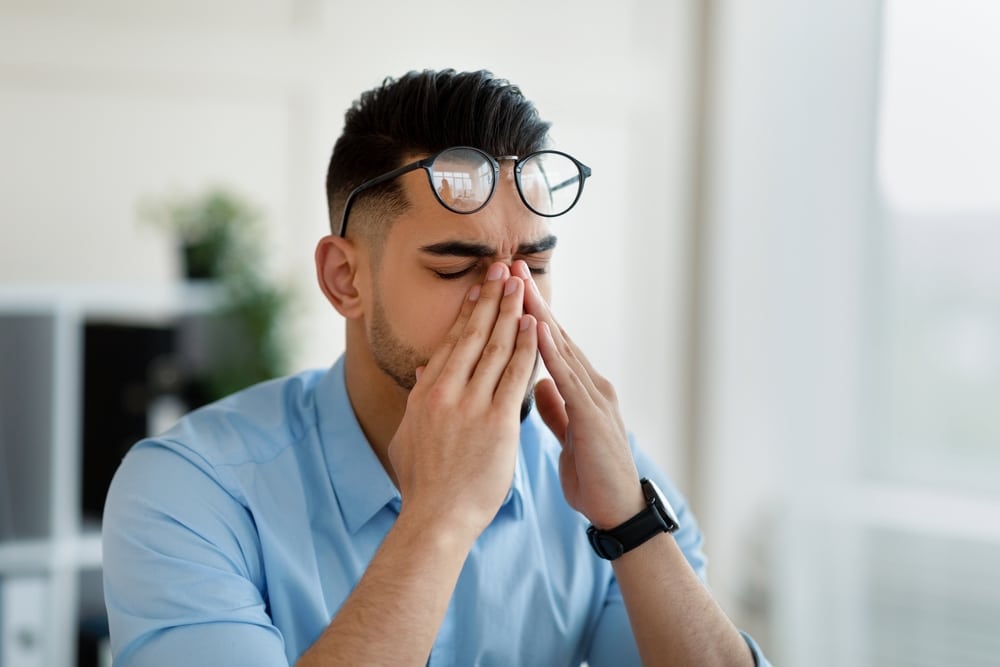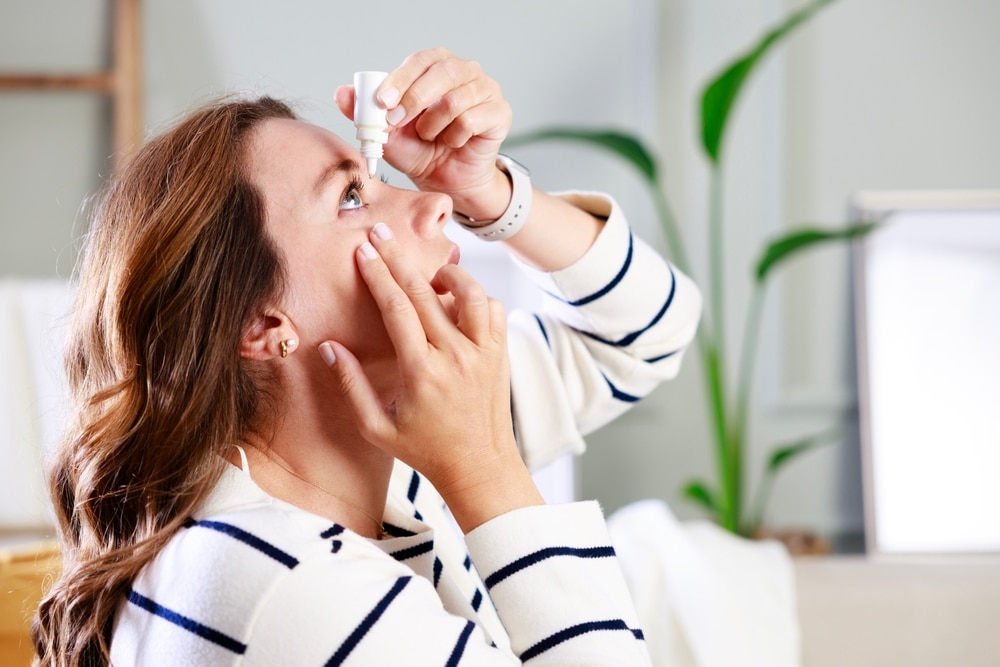Persistent eye itching affects millions of people daily, transforming routine activities into uncomfortable experiences. Whether you’re dealing with seasonal flare-ups or chronic irritation, understanding the root cause of your symptoms is essential for finding lasting relief.
Keep reading to learn more about what causes itchy eyes and when it’s time to seek professional treatment.
Why Do My Eyes Itch?
Itchy eyes rarely occur in isolation. Accompanying symptoms provide valuable clues about the underlying condition affecting your visual comfort:
Seasonal and Environmental Allergies
Allergic conjunctivitis is a leading cause of persistent eye itching. Common triggers include tree pollen, grass allergens, dust mites, pet dander, and mold spores that come into contact with the conjunctiva directly.
Spring and fall seasons typically produce the most severe symptoms as airborne pollen concentrations peak. However, indoor allergens such as dust mites and pet dander can cause year-round discomfort for individuals with sensitive allergies.
Eye itching can occur when your immune system responds to perceived threats or irritants affecting the delicate tissues around your eyes. The conjunctiva, a thin membrane covering the white portion of your eye, contains specialized cells that release histamines when exposed to allergens or inflammatory triggers.
The body’s histamine response to these allergens creates intense itching, often accompanied by clear, watery discharge and significant eyelid swelling. Rubbing affected eyes frequently worsens symptoms and can introduce secondary bacterial infections.
Meibomian Gland Dysfunction
The meibomian glands, located along your eyelid margins, produce essential oils that prevent tear evaporation. When these tiny glands become blocked or inflamed, the quality of tears deteriorates rapidly, leading to surface irritation and persistent itching.
Hormonal changes, certain medications, and microscopic mites living along the lash line commonly contribute to meibomian gland dysfunction. Age-related changes also increase the likelihood of developing this condition over time.
Without adequate oil production, tears evaporate too quickly, leaving the eye surfaces vulnerable to irritation from environmental factors such as wind, dust, and exposure to digital screens.
Dry Eye
Dry eye occurs when your eyes are lacking in one of the essential components of the tear film: oil, water, or mucus. This prevents your tears from keeping your eyes moist and comfortable.
Autoimmune disorders, meibomian gland dysfunction, certain medications, and prolonged screen time contribute to dry eye development. Women experience this condition more frequently than men, particularly during hormonal transitions like menopause.
The resulting eye surface irritation produces persistent itching, burning, and foreign body sensations that worsen throughout the day.
Contact Lens Complications
Extended contact lens wear, improper cleaning protocols, and sensitivity to lens materials or solutions may trigger eye itching. Protein deposits accumulating on lens surfaces create ideal environments for bacterial growth and inflammatory reactions.
Sleeping in contact lenses not designed for overnight wear significantly increases the risk of infection and inflammatory responses. Even daily disposable lenses can cause problems when worn beyond recommended timeframes.
Switching lens types, adjusting wearing schedules, or temporarily discontinuing use often resolves contact lens-related itching.
When Should I See My Eye Doctor for Itchy Eyes?
Certain symptoms accompanying eye itching require a timely professional assessment from your eye doctor to prevent vision complications. Thick, colored discharge suggests a bacterial infection that requires antibiotic treatment.
Significant eye pain, light sensitivity, or vision changes may indicate more serious inflammatory conditions that require specialized care. Symptoms persisting beyond two weeks warrant a comprehensive evaluation to identify underlying causes and develop targeted treatment strategies.
If itching interferes with sleep, work productivity, or daily activities, professional intervention can provide relief through prescription medications and advanced treatment options not available over the counter.
How Do Eye Doctors Treat Itchy Eyes?
After performing a thorough eye exam, your eye doctor at Atlanta Vision Institute may recommend one or more treatments based on the cause and severity of your itchy eyes:
Allergy Management Strategies
Oral antihistamines and topical antihistamine eye drops provide effective relief for allergic conjunctivitis. Popular options include loratadine, cetirizine, and prescription antihistamine drops specifically formulated for ocular use.
Dry Eye and MGD Solutions
Lifestyle changes, such as incorporating more omega-3 fatty acids into your diet, using artificial tears, and limiting screen time, can help improve symptoms of dry eye and MGD. Warm compress therapy applied for 10-15 minutes twice daily specifically helps unclog blocked meibomian glands and improves oil flow.
Gentle eyelid massage following the application of compresses enhances treatment effectiveness. Other treatment options for dry eye and meibomian gland dysfunction include prescription eye drops, such as Restasis and Xiidra, as well as advanced treatments like intense pulsed light (IPL) therapy.
Contact Lens Alternatives
Taking regular breaks from contact lens wear and switching to glasses allows your eyes to recover their natural moisture balance. You may also want to consider switching to daily disposable lenses instead of monthly lenses if you’re sensitive to contact lens cleaning solutions.
For persistent contact lens-related itching, permanent vision correction through EVO ICL or SMILE procedures eliminates lens-related complications while providing clear, comfortable vision.
Comprehensive Relief Through Expert Care
Understanding the specific cause of your eye itching enables your eye doctor to provide treatment approaches that offer lasting relief rather than temporary symptom masking. Professional evaluation by an experienced ophthalmologist at Atlanta Vision Institute ensures accurate diagnosis and appropriate treatment selection for your situation.
From advanced dry eye therapies to allergy management, effective solutions exist for every cause of eye itching. Don’t let persistent eye itching limit your daily activities or quality of life.
Schedule an appointment at Atlanta Vision Institute in Atlanta, GA, today to get to the root cause of your symptoms and start on the path toward relief!

Please Take Our LASIK or Cataract Surgery Quiz
Take our vision quiz to find out if you qualify for LASIK or cataract surgery!





